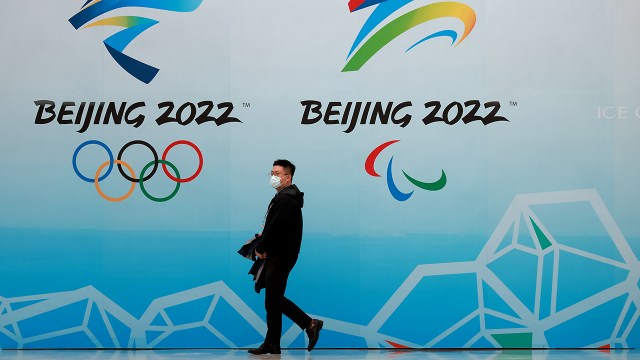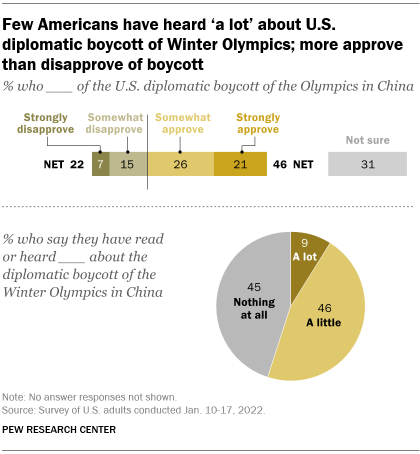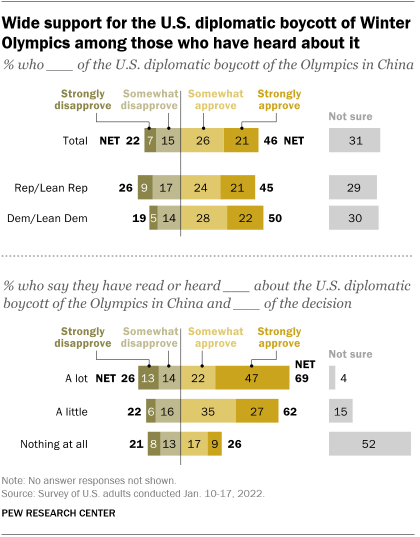
As the 2022 Winter Olympics begin later this week in China, more Americans say they approve (46%) than disapprove (22%) of the U.S. diplomatic boycott of the Games, while 31% are unsure. The diplomatic boycott, announced by the Biden administration in December to protest Chinese human rights abuses, has captured little public attention; about nine-in-ten U.S. adults (91%) say they have heard little (46%) or nothing at all (45%) about it, according to a Pew Research Center survey conducted Jan. 10-17.
The public’s views of China’s relations with the U.S. have changed very little in the past year. Currently, 54% view China as a competitor of the U.S., while 35% consider it an enemy. Just 9% say China is a partner of the United States.
Under a diplomatic boycott, U.S. athletes can compete in the Winter Games, but U.S. government officials or representatives will not attend. While some other countries – including the United Kingdom, Australia, Canada and Denmark – are also diplomatically boycotting these Games, most countries are not. The last (and only prior) time the U.S. took such an action was the full boycott of the Moscow Summer Olympics in 1980, to protest the Soviet Union’s invasion of Afghanistan. The USSR retaliated four years later, barring its athletes from participating in the 1984 Summer Olympics in Los Angeles.
This survey sought to measure Americans’ views about the debate over participation in the upcoming Beijing Winter Olympics because of China’s human rights record. The survey was conducted Jan. 10-17, 2022, among 5,128 U.S. adults. Everyone who took part is a member of Pew Research Center’s American Trends Panel (ATP), an online survey panel that is recruited through national, random sampling of residential addresses. This way nearly all U.S. adults have a chance of selection. The survey is weighted to be representative of the U.S. adult population by gender, race, ethnicity, partisan affiliation, education and other categories. Read more about the ATP’s methodology.
Here are the questions used for this report, along with responses, and its methodology.
The small share of adults who have heard a lot about the diplomatic boycott (9%) largely support the decision: 69% approve of the boycott, including 47% who strongly approve of it. A majority of those who have heard a little about it also approve of the boycott (62%), though just 27% strongly approve. Only about half of those who have heard nothing about the boycott offer an opinion.
Republicans and Democrats have similar views of the U.S. decision to forego diplomatic representation at the Winter Games. Half of Democrats and Democratic-leaning independents approve of the decision, as do 45% of Republicans and GOP leaners.
A slightly larger share of Republicans and Republican leaners (26%) disapprove of the U.S. diplomatic boycott compared with Democrats and Democratic leaners (19%). About a third of both Republicans and Democrats are not sure whether they approve of the boycott or not.
Evaluations of U.S. relationship with China
Americans’ views of China have grown much more negative in recent years, according to a survey conducted last year by Pew Research Center.
However, the public continues to view China more as a competitor than as an enemy of the U.S. Unlike opinions about the diplomatic boycott of the Winter Olympics, these attitudes are deeply divided along partisan and ideological lines.
About half of Republicans (52%) – including 62% of conservative Republicans – consider China an enemy of the U.S. Among Democrats, just 22% say China is an enemy of the U.S. while about three times as many (67%) say it is a competitor. There are no significant ideological differences among Democrats.
Note: Here are the questions used for this report, along with responses, and its methodology.


